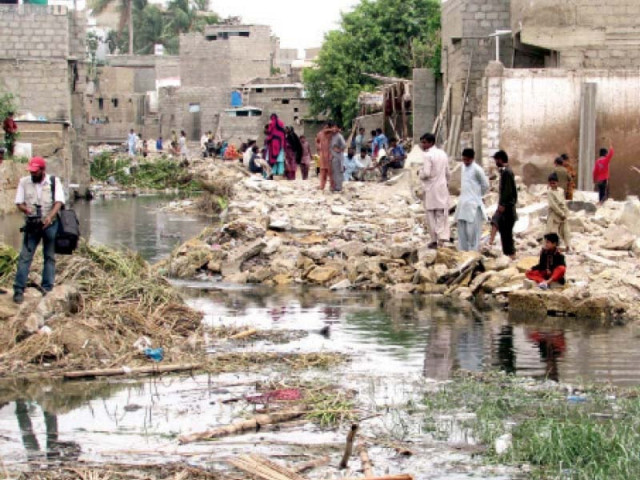Legally encroached?: As KMC clears drains, land ownership becomes blurred
Tenants claim they have all documents to prove they own the property

Storm water drains were cleared of encroachments near Cafe Pyala in Gulberg on Monday. Authorities have demolished 30 constructions on storm water drains during the latest anti-encroachment drive in the city. PHOTO: PPI
In the wake of the latest anti-encroachment drive on storm water drains in the city, a question has arisen as to who actually granted the lease, allowing the construction of houses on these drains. How indeed did these houses come to get K-Electric and Sui Southern Gas Company metres installed in these areas?
Read: A tale of Karachi's sewerage system: Garbage heaps and clogged drains
According to the Zubaida, she had purchased the house around 25 years ago, for a sum of Rs0.15 million. She claimed she had all the required documents and could produce them in any court of law. “We even receive electricity bills every month,” she said, questioning if her house was illegal, why had the authorities allowed its construction in the first place.
She admitted, however, that she knew it was illegal to live on any drain in the city. “Every year, my house inundates with rain water, but I have no choice but to live there as I cannot afford to live anywhere else,” she said.
Read: Ill-prepared: KMC’s rain emergency centres yet to start working
Like Zubaida, hundreds of people thronged Cafe Pyala hotel to inquire whether if the anti-encroachment drive continued, would their houses be demolished too? The additional deputy commissioner, Shujaat Ali, told The Express Tribune that there were around 100 houses that were to be demolished to make space for the water to flow freely. According to Ali, there were six buffalo farms set up right on Gujjar Nala and their owners used to dump the animals’ waste in the drain, which had completely chocked the nullah.
Ali said that any encroachment up till Ziauddin Hospital, within 10 feet limit of the nullah, would be demolished. On a question if the encroachment on KBR nullah would be removed too, he responded that for now, only the encroachment on Gujjar nullah will be removed. “We cannot open all fronts at a time,” he explained, adding that around 30 houses within one kilometer of the encroached area had been demolished and around 70 more constructions have to be destroyed.
The KMC’s anti-encroachment director, Mazhar Khan, said that the nullah has to be widened by 40 feet so that the road on both side of this rain drain can be constructed. Around 29,000 houses will have to be demolished for this purpose. According to him, this will be part of the Gujjar nullah resettlement project. For now, however, they were only removing constructions that were obstructing the flow of water. He assured that the houses which were leased by the KMC would be compensated according to the resettlement laws. However, Khan was of the opinion that there was not a single construction on the nullah which had been leased.
When the KMC’s land director, Nasir Abbas, was asked why leases on these rain drains were issued, he responded that the department has never issued such leases. “All these leases are illegal and any seal or signature of any official of the KMC on any document pertaining to these encroachments is forged.” he said, adding that the department will take action against those who had issued fake leases.
Karachi Commissioner Shoaib Ahmed Siddiqui, who has the additional charge of the administrator of Karachi, has already ordered to bring all the 30 major rain drains of the city in to their original condition. He has cancelled the lease of all structures on these drains, which were issued against the master plan of the city.
Meanwhile, the KE’s spokesperson, Osama Qureshi, said that the electric meters that were installed in such houses were around 40 years old. In 2012, on the orders of the Sindh High Court, they were bind not to install meters in any house without verification of documents.
Published in The Express Tribune, August 5th, 2015.



















COMMENTS
Comments are moderated and generally will be posted if they are on-topic and not abusive.
For more information, please see our Comments FAQ